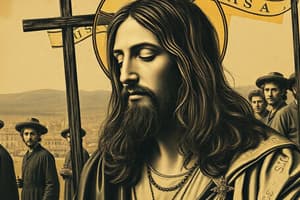Podcast
Questions and Answers
What distinguishes the author's perspective on the New Testament compared to other theologians?
What distinguishes the author's perspective on the New Testament compared to other theologians?
- His focus on ancient Greek texts.
- His belief in the superiority of European Enlightenment philosophy.
- His personal experiences living in El Salvador. (correct)
- His specialization in Old Testament studies.
What does Sobrino interpret the encounter between Jesus and Pilate to represent?
What does Sobrino interpret the encounter between Jesus and Pilate to represent?
- A trial based solely on legal grounds
- A theological discussion about the nature of God
- An argument about the role of Jesus as a Messiah
- A confrontation between the Kingdom of God and the Roman Empire (correct)
What does the concept of 'fusion of horizons' refer to in interpretation?
What does the concept of 'fusion of horizons' refer to in interpretation?
- Focusing solely on the author's intent.
- Combining different historical periods for analysis.
- Interpreting texts with a singular cultural perspective.
- The merging of insight between the text and its interpreter. (correct)
What does Sobrino suggest was the reason for Jesus' death?
What does Sobrino suggest was the reason for Jesus' death?
How do Latin American liberation theologians view their socio-political conditions?
How do Latin American liberation theologians view their socio-political conditions?
What concept does Sobrino emphasize regarding the interpreter's approach to biblical texts?
What concept does Sobrino emphasize regarding the interpreter's approach to biblical texts?
What historical events influenced the author's theological perspective?
What historical events influenced the author's theological perspective?
Which philosophical approach influences Sobrino's work, as mentioned in the content?
Which philosophical approach influences Sobrino's work, as mentioned in the content?
What does the author imply about the world in which Jesus lived?
What does the author imply about the world in which Jesus lived?
How does Sobrino view the Bible in relation to its original circumstances?
How does Sobrino view the Bible in relation to its original circumstances?
What is a key criticism from Indian and African theologians toward European approaches to biblical texts?
What is a key criticism from Indian and African theologians toward European approaches to biblical texts?
What methodology does Sobrino claim to use for interpreting the death of Jesus?
What methodology does Sobrino claim to use for interpreting the death of Jesus?
Why does the author emphasize the importance of understanding Jesus' passion and death?
Why does the author emphasize the importance of understanding Jesus' passion and death?
What experience does the author bring to his theological work that many lack?
What experience does the author bring to his theological work that many lack?
Which group does Sobrino suggest Jesus' death connects with throughout history?
Which group does Sobrino suggest Jesus' death connects with throughout history?
What does Sobrino's perspective on tradition emphasize?
What does Sobrino's perspective on tradition emphasize?
What does Burton L. Mack suggest is the best source for understanding Jesus?
What does Burton L. Mack suggest is the best source for understanding Jesus?
How does E.P. Sanders interpret the cleansing of the temple?
How does E.P. Sanders interpret the cleansing of the temple?
What is Jon Sobrino's approach to Jesus research?
What is Jon Sobrino's approach to Jesus research?
What were the major charges against Jesus during his trials?
What were the major charges against Jesus during his trials?
According to the views presented, why do temple officials not seem to regard Jesus as a serious political threat?
According to the views presented, why do temple officials not seem to regard Jesus as a serious political threat?
How did Jesus' actions in the temple impact the charges against him?
How did Jesus' actions in the temple impact the charges against him?
What misunderstanding does E.P. Sanders believe contributed to Jesus's death?
What misunderstanding does E.P. Sanders believe contributed to Jesus's death?
What does Sobrino hope to highlight through his approach to theology?
What does Sobrino hope to highlight through his approach to theology?
What does Sobrino suggest about the accusation against Jesus during his religious trial?
What does Sobrino suggest about the accusation against Jesus during his religious trial?
What characterizes the Jesus depicted in the wisdom stratum according to Mack?
What characterizes the Jesus depicted in the wisdom stratum according to Mack?
What was the key phrase used in the inscription on the cross that related to the charges against Jesus?
What was the key phrase used in the inscription on the cross that related to the charges against Jesus?
What was the Sanhedrin's primary concern regarding Jesus?
What was the Sanhedrin's primary concern regarding Jesus?
What is a key methodological contribution of Jon Sobrino to the study of Jesus?
What is a key methodological contribution of Jon Sobrino to the study of Jesus?
How did Roman authorities perceive Jesus' claim to be the Messiah?
How did Roman authorities perceive Jesus' claim to be the Messiah?
Which Gospel account presents Pilate as hesitant to execute Jesus?
Which Gospel account presents Pilate as hesitant to execute Jesus?
What significant action did Jesus take upon entering the city that was viewed as confrontational?
What significant action did Jesus take upon entering the city that was viewed as confrontational?
What is the focus of Jon Sobrino's work in Jesus the Liberator?
What is the focus of Jon Sobrino's work in Jesus the Liberator?
Which methodological approach does Jon Sobrino utilize in his treatment of Jesus?
Which methodological approach does Jon Sobrino utilize in his treatment of Jesus?
What is often criticized about rigid adherence to historical criticism regarding Jesus?
What is often criticized about rigid adherence to historical criticism regarding Jesus?
In the seminar entitled 'Jesus and Hermeneutics', who are primarily studied as historians?
In the seminar entitled 'Jesus and Hermeneutics', who are primarily studied as historians?
Which of the following represents a theoretical perspective included in the seminar?
Which of the following represents a theoretical perspective included in the seminar?
What has Jon Sobrino contributed to the discussions about the historical Jesus?
What has Jon Sobrino contributed to the discussions about the historical Jesus?
What did the seminar 'Jesus and Hermeneutics' aim to achieve?
What did the seminar 'Jesus and Hermeneutics' aim to achieve?
Which aspect of Jesus' life does Sobrino particularly focus on in relation to his death?
Which aspect of Jesus' life does Sobrino particularly focus on in relation to his death?
Flashcards are hidden until you start studying
Study Notes
Jon Sobrino's Historical-Theological Approach to the Death of Jesus
-
The "third quest" for the historical Jesus involves trying to understand what is going on in the new books about Jesus and what we can learn about Jesus, history, and theological methodology.
-
Sobrino's perspective offers an important methodological contribution to the historical and theological study of Jesus, particularly his death.
-
Sobrino's approach is considered "historical-theological," which means that he takes seriously the historical data and does theology based on and in the light of this data.
-
Sobrino's work is not considered historical criticism in the narrow sense, but rather a "historical-theological reading of Jesus of Nazareth."
-
The charges against Jesus involved his threat to destroy the Jerusalem temple and his claims of being the Messiah.
-
Sobrino's interpretation suggests that Jesus was executed because of his life, teachings, and actions, which posed a threat to the religious and political authorities of his time.
-
The trial before Pilate is seen as a confrontation between two mediators, two mediations, the Kingdom of God, and the Roman Empire, reflecting the conflict between Jesus and the Roman political structure.
-
Sobrino's methodology is informed by philosophical hermeneutics, particularly concepts such as preunderstanding, fusion of horizons, verification, and appropriation.
Preunderstanding
-
Preunderstanding refers to the set of prejudices that an interpreter brings to the text.
-
Sobrino's prejudices include the assumption that the Bible is a classic and sacred text, transcending its original circumstances and offering an opportunity to encounter God.
-
Sobrino's background as a Spanish Catholic priest, Jesuit, and professor of theology, living and working in El Salvador, informs his understanding of the Bible.
-
His conviction is that the strong parallels between first-century Palestine and late-twentieth-century El Salvador allow him to see aspects of the New Testament that others might miss.
-
Latin American liberation theologians argue that they have a closer intellectual and emotional kinship with the biblical authors than those influenced by the European Enlightenment.
Fusion of Horizons
-
Fusion of horizons involves the interplay and dialogue between the text and the interpreter, sharing a common meaning.
-
Sobrino's approach to the Gospel passion narratives is shaped by his personal experiences and his understanding of the struggle for justice in Latin America.
-
His experiences with Archbishop Oscar Romero's assassination and the murder of other Jesuit colleagues provide a powerful perspective on oppression and suffering.
-
Sobrino's ability to engage with Jesus' passion and death, drawing parallels with the struggles of the Latin American people, makes his work resonate with those facing similar challenges.
Studying That Suits You
Use AI to generate personalized quizzes and flashcards to suit your learning preferences.

